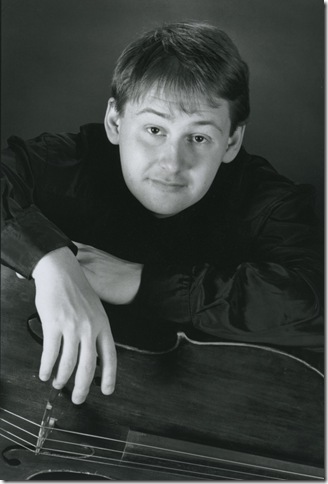The six cello suites of J.S. Bach are monumental in every significant way, which means that Saturday afternoon’s traversal of all six in a Lake Worth church was itself a monument for local audiences.
And Alexei Romanenko, who brought these great works to a decent-sized pre-season crowd at Calvary United Methodist, showed that he has all the skill, taste and imagination he needs to fully represent these nearly 300-year-old suites and bring them wonderfully alive.
His work reminds me of no one so much as Yo-Yo Ma: the same flawless intonation, smooth-as-fine-silk fingerwork, and a sense of sovereign, easy mastery over his instrument. Romanenko, principal cellist of the Jacksonville Symphony Orchestra, virtually never seemed as though he was working hard, and even to the most well-known sections of these pieces he brought an interpretation that was all his own.
Romanenko’s complete control over every aspect of this music led to a general feeling of coolness and restraint for much of the recital, but in no sense was it remote or un-engaging. The Vladivostok-born cellist played the six suites out of numerical order – Nos. 5 and 3, 4 and 1, then 2 and 6, with two short intermissions – but it worked beautifully; the first and third pairs were in parallel keys, and the transition from the somber C minor of the opening fifth suite to the D major exultation of the closing sixth suite created a fine and compelling narrative arc.
Aside from the overall sweep of this conception, there were marvelous individual moments. Most telling of all, perhaps, were the slow sarabande movements of each suite, to all of which Romanenko gave a sense of grave beauty, and each had the same kind of attention to phrasing detail that makes them distinctive. In the fourth suite (in E-flat, BWV 1010), for instance, the little two-note half-step gestures that close the movement were precisely played, tying up the movement as though he were adding just the right bow to an elegant package.
The well-known opening of the first suite (in G major, BWV 1007) was played very briskly indeed, quite unlike the medium-tempo tradition, but much more in keeping with the style brisé of Bach’s French contemporaries, which the composer was no doubt emulating. It was refreshing and bold, as was the almost-as-familiar Gavotte of the sixth suite (in D major, BWV 1012), in which Romanenko played the crunching triple stops tightly yet resonantly, which let the melody ring out much more clearly than is often the case, where this catchy tune sounds like it is struggling, Incredible Hulk-like, to greenly burst its structural bounds.
Romanenko also was able to give each of the suites a specific character, which is harder to do than it might sound because of the same-key conventions for the individual movements of suites written in the early 18th century. And yet here was a second suite (in D minor, BWV 1008) that was distinguished by a sober clarity throughout, in sharp contrast to the air of mystery he gave to the fifth suite (in C minor, BWV 1011); a third suite (in C major, BWV 1009) that was strong and hearty (especially in the pair of bourrees); a sixth suite that was almost over the top as Romanenko made his A string do double duty for the missing fifth string on the cello cousin for which this suite actually was composed.
From start to finish, for more than two hours, Romanenko was able to hold his audience in rapt attention to some of the most challenging, difficult and sublime pieces in the literature for solo cello, and that’s no small accomplishment. This was as excellent, polished and lovely a reading of these works as I’ve heard in some time, and that he was able to pull it off with such apparent ease means that it may take some time for his auditors to realize just how impressive a concert they attended Saturday afternoon.
But it was remarkable. Even if you disagreed with some of his choices, what could not be argued is that Alexei Romanenko has found solutions for some of the problems these pieces present. And he did it in a way that will stand, for me at least, as definitive.
